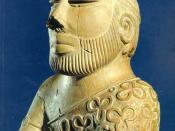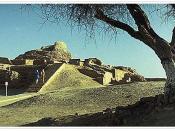Egypt
Egypt, one of the first empires, was organized and unified around 3100 and 2900BC. It was a semi-independent state until the Roman conquest in 30BC. Egypt's long existence could have been because of their isolation from the rest of the world. The unending desert surrounded it on three sides and the Isthmus Suez, the only entrance into Egypt, surrounded it on the other. This was good for the Egyptians, since they didn't like change. A possible reason for their dislike could have been for their hierarchy system. The Gods were at the top, the dead under the Gods, the pharaoh was under the dead, and the citizens were at the bottom. This is where the saying "If it works, do not try to fix it" comes from. If life is acceptable as it stands, why change it?
Egypt was fine as it was. It was a very agricultural country, partly because of the fertile soil the Nile brought down each year, which meant a lot of people would be looking for jobs in that industry.
Since there were no jobs left, those people were used to build the Great Pyramids during a 400 year span from about 2700 to about 2300BC. These pyramids were built as large tombs for the royal family at the top of the hierarchy. This means that they prepared for the death of a members of they royal family, even before they were born. It may seem odd, but the Egyptians knew that death, a good thing, faced them, so they spent their lives and their fortunes (if they had any at all) preparing for it. It was after all, two large steps up their hierarchy system.
The ways of the Egyptians are mysterious. Why did they stay the same for nearly three thousand years,



Egypt
the egypt section of this essay bothered me. the author wonders why the ancient egyptians technology never evolved durring the 3000 or so years of their existance. what, i ask, about the irrigation technology that they developed in order to make more fertile the land further away from the nile? they were also the first peoples to think of storring food up so that over the years, when the nile flooded too much and destroyed most of the crops, they still had enough foods, also when the nile didnt flood far enough to water all the needed crops they had food in store. why were they able to build the great pyramids into almost perfect measurments if the technology wasnt good? also, being dead wasnt part of the heirarchy... they prepared for death because those who didnt were doomed to eternal nothingness and those who did, their afterlife being good depended on how well they prepared for it. the pharos were right under the gods since they were deemed to be direct decendants of them. and last off... if change was such a bad thing for their society, how were they one of the only peoples (past and present day included) to accept a woman as their pharo/ruler/leader?
i cant comment on the other portions of this paper because i do not have enough knowlege in those areas.
2 out of 2 people found this comment useful.